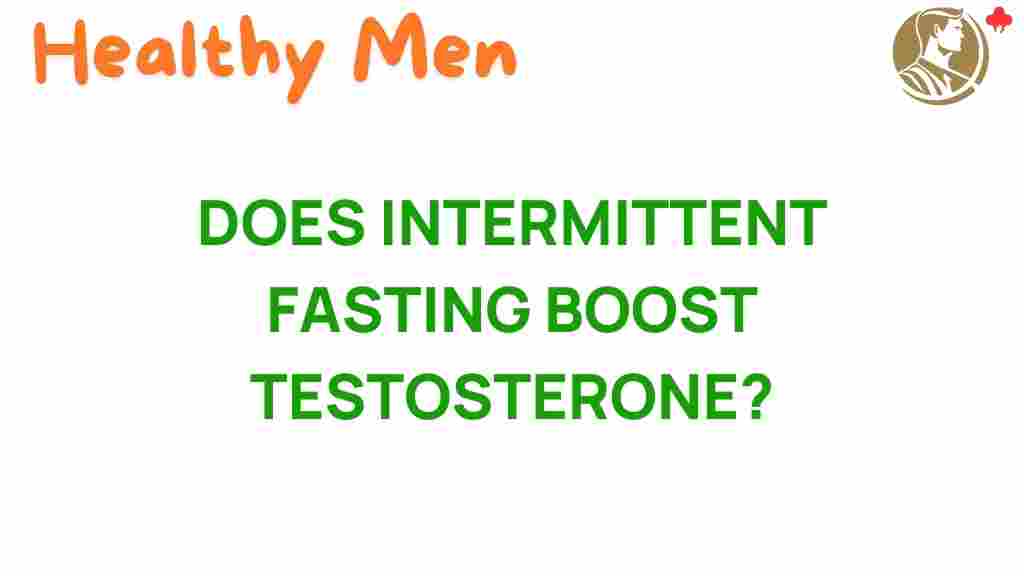Does Intermittent Fasting Really Boost Testosterone Levels?
Intermittent fasting (IF) has gained immense popularity as a lifestyle choice among fitness enthusiasts and health-conscious individuals alike. Many people are curious about its potential effects on hormone levels, especially testosterone. In this article, we will explore the relationship between intermittent fasting and testosterone, examining how this eating pattern may influence hormonal balance, metabolism, and overall health benefits.
Understanding Intermittent Fasting
Intermittent fasting involves cycling between periods of eating and fasting. It is not about what you eat but rather when you eat. Common methods of intermittent fasting include:
- 16/8 Method: Fast for 16 hours and eat during an 8-hour window.
- 5:2 Diet: Eat normally for five days and restrict calories to about 500-600 for two days.
- Eat-Stop-Eat: Fast for 24 hours once or twice a week.
This lifestyle choice is often adopted for various reasons, including weight loss, improved metabolic health, and enhanced physical performance. But what about its impact on testosterone levels?
The Role of Testosterone in Health and Fitness
Testosterone is a vital hormone in both men and women, playing a crucial role in various bodily functions, including:
- Muscle Mass: Testosterone aids in building and maintaining muscle mass.
- Bone Density: It contributes to bone strength and density.
- Fat Distribution: Testosterone influences how body fat is distributed.
- Libido: It plays a significant role in sexual health and libido.
Low testosterone levels can lead to a host of health issues, such as fatigue, reduced muscle mass, and increased fat accumulation. Therefore, finding ways to optimize testosterone levels is essential for maintaining overall health and fitness.
Intermittent Fasting and Testosterone: The Connection
Research indicates that intermittent fasting may positively impact testosterone levels. Here’s how:
- Improved Insulin Sensitivity: IF can enhance insulin sensitivity, which is crucial for hormonal balance, including testosterone production.
- Weight Loss: Intermittent fasting often leads to weight loss, which is associated with increased testosterone levels.
- Increased Growth Hormone Levels: Fasting can increase growth hormone levels, which may correlate with higher testosterone production.
- Reduced Inflammation: IF may reduce inflammation, which can negatively affect testosterone levels.
These factors combined suggest that intermittent fasting might be a beneficial practice for those looking to boost their testosterone levels naturally.
The Science Behind Intermittent Fasting and Testosterone
Several studies have explored the relationship between intermittent fasting and hormone levels. For instance:
- A study published in the Journal of Clinical Endocrinology and Metabolism found that men who followed an intermittent fasting regimen experienced significant increases in testosterone levels compared to those who did not.
- Another study indicated that fasting can lead to elevated levels of luteinizing hormone (LH), which stimulates testosterone production.
While these findings are promising, it’s essential to note that individual responses to intermittent fasting can vary. Factors such as age, baseline testosterone levels, and overall health can influence the outcomes.
Adopting Intermittent Fasting for Hormonal Balance
If you’re considering incorporating intermittent fasting into your lifestyle for its potential testosterone-boosting benefits, follow these steps:
Step 1: Choose Your Fasting Method
Select a method that fits your lifestyle. The 16/8 method is popular for beginners, as it allows for a daily eating window that can easily be integrated into most schedules.
Step 2: Focus on Nutrition
During your eating window, prioritize nutrient-dense foods to support hormonal balance:
- Lean Proteins: Chicken, fish, eggs, and legumes are excellent sources.
- Healthy Fats: Incorporate avocados, nuts, seeds, and olive oil.
- Complex Carbohydrates: Whole grains, fruits, and vegetables should be staples.
Step 3: Stay Hydrated
Drink plenty of water during fasting and eating periods. Staying hydrated is crucial for overall health and can help optimize metabolism.
Step 4: Monitor Your Progress
Keep track of your energy levels, weight changes, and any alterations in your mood or fitness performance. This can help you assess whether intermittent fasting is effective for you.
Step 5: Consult a Healthcare Professional
Before starting any new dietary regimen, especially if you have underlying health conditions, consult a healthcare provider. They can provide personalized advice based on your health status.
Potential Challenges and Troubleshooting Tips
While intermittent fasting can offer numerous health benefits, it may come with challenges. Here are some common issues and tips to overcome them:
- Hunger Pangs: Drink water or herbal teas to help manage hunger. Gradually increase your fasting duration to adapt.
- Low Energy Levels: Ensure you are consuming enough calories and nutrients during your eating window. Focus on balanced meals.
- Social Situations: Plan your fasting schedule around social events. Communicate with friends and family about your new lifestyle.
It’s important to listen to your body. If you feel unwell or overly fatigued, consider adjusting your fasting approach or discontinuing it altogether.
Conclusion
Intermittent fasting may indeed boost testosterone levels and offer various health benefits when integrated into a balanced lifestyle. By improving metabolic health, supporting weight loss, and promoting hormonal balance, intermittent fasting can be a powerful tool in enhancing overall fitness and well-being.
As with any lifestyle change, individual responses can vary, so it’s crucial to approach intermittent fasting thoughtfully. Remember to prioritize nutrition, stay hydrated, and monitor your progress. For more information on nutrition and lifestyle changes, check out our nutrition guide.
In summary, if you’re looking to optimize your testosterone levels naturally while reaping the benefits of intermittent fasting, consider giving it a try. With the right approach, it can contribute positively to your health journey.
This article is in the category Nutrition and created by healthymen Team
